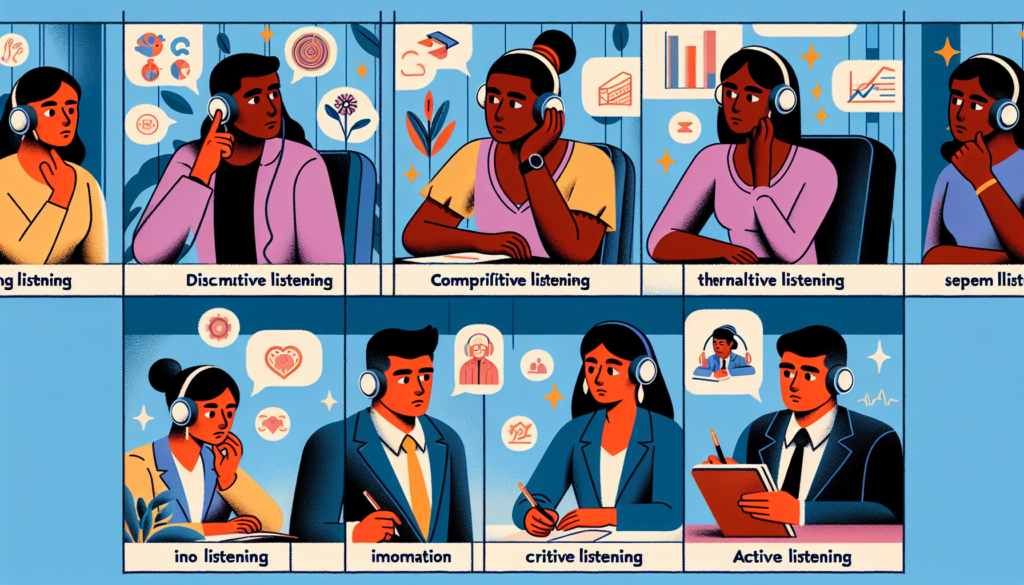“`html
Different Types of Effective Listening Techniques
Effective listening is a crucial skill that plays a vital role in communication. It is not just about hearing words but understanding the message behind them. In this blog post, we’ll explore different types of effective listening techniques that can enhance your communication skills, improve relationships, and foster understanding. Here, we will delve into various techniques, their importance, and how to apply them in daily life.
Understanding Effective Listening
Effective listening involves more than just hearing. It requires a conscious effort to understand, interpret, and respond thoughtfully. The importance of effective listening cannot be overstated as it leads to better interpersonal relationships, reduces misunderstandings, and enhances collaboration.
Types of Listening Techniques
There are several effective listening techniques, and mastering them can greatly improve your communication. Let’s explore these techniques one by one:
1. Active Listening
Active listening is a technique that involves fully concentrating, understanding, responding, and remembering what is being said. It requires a physical and mental commitment to engage with the speaker.
- Engagement: Maintain eye contact and show you are interested.
- Feedback: Offer verbal and non-verbal feedback to show understanding.
- Restating: Paraphrase what the speaker has said to confirm your understanding.
2. Reflective Listening
Reflective listening is similar to active listening but focuses more on reflecting back what the speaker is saying. This technique is useful in counseling and conflict resolution.
- Summarization: Summarize the speaker’s message to ensure clarity.
- Validation: Validate the feelings and thoughts of the speaker.
- Encouragement: Encourage further sharing through affirmations like “I understand.”
3. Empathic Listening
Empathic listening goes beyond the surface of words to understand feelings and emotions. This technique helps build a connection with the speaker.
- Emotional Attunement: Tune into the speaker’s emotions and respond accordingly.
- Non-Judgment: Avoid judging or offering solutions immediately.
- Supportive Responses: Use phrases that support and reassure the speaker.
4. Comprehensive Listening
Comprehensive listening focuses on understanding the content of the message. It is often used in educational settings and meetings.
- Note-taking: Take notes to retain information.
- Asking Questions: Ask clarifying questions to gain more insight.
- Organizing Information: Structure the information in a logical manner.
5. Critical Listening
Critical listening is the ability to evaluate and analyze the speaker’s message. This is important for decision-making and assessing the credibility of information.
- Judgment: Assess the validity of the message.
- Identifying Bias: Recognize any potential bias in the speaker’s position.
- Reasoning: Analyze the arguments and form your own conclusions.
Tips for Improving Listening Skills
Here are some practical tips to enhance your listening skills:
- Practice Mindfulness: Be present in the moment when someone is speaking.
- Avoid Interrupting: Let the speaker finish their thoughts completely.
- Stay Open-Minded: Keep an open mind and be willing to understand different perspectives.
- Limit Distractions: Find a quiet environment to improve focus.
- Practice Regularly: Use everyday conversations to practice different listening techniques.
Why Listening Matters
Listening is key for effective communication. Here are some reasons why it matters:
- Builds Trust: Active listening creates a safe space and fosters trust.
- Enhances Understanding: It leads to better understanding and avoids miscommunication.
- Strengthens Relationships: Good listening skills strengthen personal and professional relationships.
- Encourages Collaboration: Effective listening facilitates teamwork and collaboration.
Conclusion
In conclusion, mastering effective listening techniques is essential for successful communication. By applying active, reflective, empathic, comprehensive, and critical listening techniques, you can enhance your relationships, reduce misunderstandings, and foster a deeper understanding with those around you. Remember that listening is a skill that can be improved with practice, so make an effort to develop these techniques in your daily life.
Effective listening is not just a passive activity; it plays an active role in your communication journey. Start practicing these techniques today and witness the positive change it brings in your interactions.
“`


